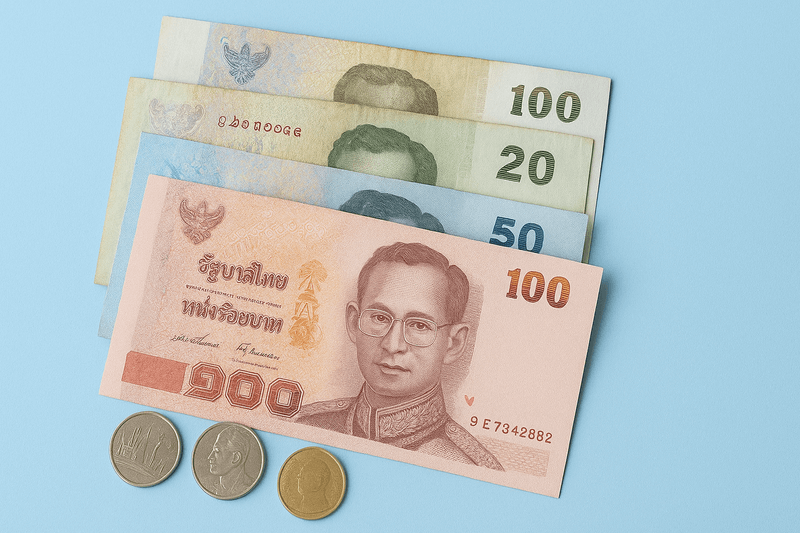What is the currency in Thailand? Guide for digital nomads

The official currency of Thailand is the Thai Baht (THB), symbolized by 701. For digital nomads planning to work remotely in the country, understanding the local currency is essential for managing finances and meeting DTV visa requirements. Discover everything about the Thai baht and how it impacts your journey as a remote professional in Southeast Asia.
History and characteristics of Thai Baht
The Thai baht has a rich history dating back to the 14th century. The name “baht” derives from the Sanskrit word meaning “weight”, reflecting its origin as a unit of measurement for precious metals.
Historical evolution
The modern currency was established in 1897 during the reign of King Chulalongkorn. Since then, it has undergone several important reforms:
- 1902: First standardization with decimal system
- 1928: Creation of the Bank of Thailand
- 1942-1945: Linked to the Japanese yen during World War II
- 1997: Asian financial crisis led to currency fluctuation
- 2018: Introduction of banknotes with anti-counterfeiting technology
Current denominations
The baht is divided into 100 satang. Denominations in circulation include:
Coins: 1, 2, 5 and 10 baht Notes: 20, 50, 100, 500 and 1,000 baht
Each note has different colors and advanced security elements, making it easy to recognize.
Current conversion and exchange rate trends
As of August 2025, the price is at ₹1,000 THB = R$ 166.90 BRL, which means approximately R$ 0.1669 per baht.
Factors that influence the THB/BRL exchange rate
Thai economy:
- Tourism represents 15% of GDP
- Electronics exports and agriculture
- Monetary policies of the Bank of Thailand
Brazilian scenario:
- Fluctuations of the real against the dollar
- Domestic economic policies
- Foreign investment flow
As demonstrated in our guide on Currency and exchange in Australia, understanding these variables helps with long-term financial planning.
Financial requirements for digital nomads
O DTV visa for digital nomads establishes specific financial criteria that every candidate must meet.
Mandatory proof of ₹500,000
In converted values (August 2025):
- ₹500,000 THB = R$ 83,450
- Must remain in account for at least 3 months
- Checking or savings accounts are accepted
- Bank statements must be translated
Required financial documentation
- Detailed bank statements
- Last 6 months of movement
- Consistently maintained minimum balance
- Clearly identified source of resources
- Income tax return
- Last full statement
- Proof of delivery to the Internal Revenue Service
- Remote work contracts
- Evidence of recurring income
- Letters from clients or employers
Unlike other destinations, Thailand does not require a fixed monthly income, only the initial financial reserve. This makes access more flexible for freelancers with variable earnings.
Cost of living by city in baht
Understanding local costs in baht helps with actual budget planning. As discussed in our comparison Chiang Mai or Bangkok, each city offers different levels of spending.
Chiang Mai: maximum economy
Monthly budget: 701 000 (R$ 10,014)
- Studio rental: ₹15,000-25,000
- Food: ₹12,000-18,000
- Transportation: ₹3,000-5,000
- Coworking: ₹3,000-8,000
- Lazer: ₹8,000-12,000
Bangkok: vibrant metropolis
Monthly budget: ₹84,000 (R$ 14,020)
- Apartment rental: ₹25,000-40,000
- Food: ₹15,000-22,000
- Transportation: ₹4,000-8,000
- Coworking: CH5,000-12,000
- Lazer: ₹12,000-18,000
Phuket: premium lifestyle
Monthly budget: ₹105,000 (R$ 17,524)
- Sea view rental: ₹35,000-55,000
- Food: ₹18,000-25,000
- Transportation: ₹6,000-10,000
- Coworking: ₹6,000-15,000
- Lazer: ₹15,000-25,000
Financial advantages of being a digital nomad in Thailand
Thailand offers unique economic benefits that few destinations can match. As evidenced in Fun facts about being a digital nomad in Thailand, the country combines low cost with high quality of life.
High purchasing power
With the real valued against the baht, Brazilians enjoy higher purchasing power:
Practical examples:
- Full meal: ₹80-150 (R$ 13-25)
- Therapeutic massage: ₹300-500 (R$ 50-83)
- Daily public transport: ₹50-100 (R$ 8-17)
- Monthly Academy: ₹1,500-3,000 (R$ 250-500)
Tax benefits
Thailand does not tax income generated abroad, benefiting digital nomads who:
- They keep Brazilian customers
- They work for foreign companies
- They receive international royalties or dividends
Low-cost infrastructure
Essential services cost fractions of Brazilian prices:
- Fiber optic Internet: ▼ 599-999/month (R$ 100-167)
- Unlimited phone plan: ▼ 399-799/month (R$ 67-133)
- Private health insurance: ₹3,000-8,000/month (R$ 500-1,335)
Practical financial management for nomads
International cards and transfers
Efficient options:
- Wise (formerly TransferWise): Competitive rates
Recommended cards:
- Cards without an international fee
- Multi-currency accounts
- Financial management apps
Tax planning
Although Thailand does not tax foreign income, Brazilians should consider:
- Tax obligations in Brazil
- Declaration of assets abroad
- Communication with Brazilian accountant
As detailed in our DTV visa costs, adequate financial planning guarantees approval and smooth permanence.
Be Easy: your financial partner in Thailand
A Be Easy offers expert advice for digital nomads who want to optimize their finances in Thailand. Our experienced team advises on banking documentation, cost planning, and strategies to meet DTV visa requirements. Don't let financial issues complicate your plans to work remotely in the Thai paradise. Contact us and discover how we can facilitate your financial management as a digital nomad in Thailand!


